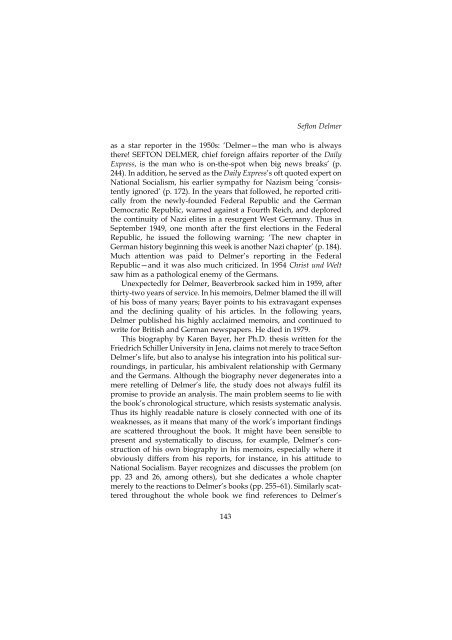Download - German Historical Institute London
Download - German Historical Institute London
Download - German Historical Institute London
Create successful ePaper yourself
Turn your PDF publications into a flip-book with our unique Google optimized e-Paper software.
143<br />
Sefton Delmer<br />
as a star reporter in the 1950s: ‘Delmer—the man who is always<br />
there! SEFTON DELMER, chief foreign affairs reporter of the Daily<br />
Express, is the man who is on-the-spot when big news breaks’ (p.<br />
244). In addition, he served as the Daily Express’s oft quoted expert on<br />
National Socialism, his earlier sympathy for Nazism being ‘consistently<br />
ignored’ (p. 172). In the years that followed, he reported critically<br />
from the newly-founded Federal Republic and the <strong>German</strong><br />
Democratic Republic, warned against a Fourth Reich, and deplored<br />
the continuity of Nazi elites in a resurgent West <strong>German</strong>y. Thus in<br />
September 1949, one month after the first elections in the Federal<br />
Republic, he issued the following warning: ‘The new chapter in<br />
<strong>German</strong> history beginning this week is another Nazi chapter’ (p. 184).<br />
Much attention was paid to Delmer’s reporting in the Federal<br />
Republic—and it was also much criticized. In 1954 Christ und Welt<br />
saw him as a pathological enemy of the <strong>German</strong>s.<br />
Unexpectedly for Delmer, Beaverbrook sacked him in 1959, after<br />
thirty-two years of service. In his memoirs, Delmer blamed the ill will<br />
of his boss of many years; Bayer points to his extravagant expenses<br />
and the declining quality of his articles. In the following years,<br />
Delmer published his highly acclaimed memoirs, and continued to<br />
write for British and <strong>German</strong> newspapers. He died in 1979.<br />
This biography by Karen Bayer, her Ph.D. thesis written for the<br />
Friedrich Schiller University in Jena, claims not merely to trace Sefton<br />
Delmer’s life, but also to analyse his integration into his political surroundings,<br />
in particular, his ambivalent relationship with <strong>German</strong>y<br />
and the <strong>German</strong>s. Although the biography never degenerates into a<br />
mere retelling of Delmer’s life, the study does not always fulfil its<br />
promise to provide an analysis. The main problem seems to lie with<br />
the book’s chronological structure, which resists systematic analysis.<br />
Thus its highly readable nature is closely connected with one of its<br />
weaknesses, as it means that many of the work’s important findings<br />
are scattered throughout the book. It might have been sensible to<br />
present and systematically to discuss, for example, Delmer’s construction<br />
of his own biography in his memoirs, especially where it<br />
obviously differs from his reports, for instance, in his attitude to<br />
National Socialism. Bayer recognizes and discusses the problem (on<br />
pp. 23 and 26, among others), but she dedicates a whole chapter<br />
merely to the reactions to Delmer’s books (pp. 255–61). Similarly scattered<br />
throughout the whole book we find references to Delmer’s













